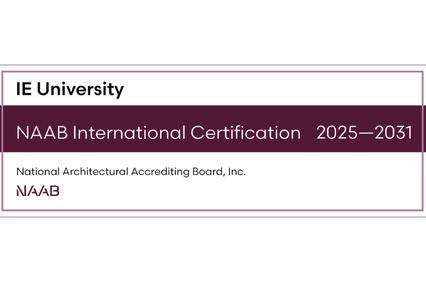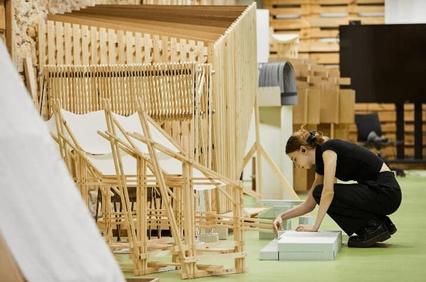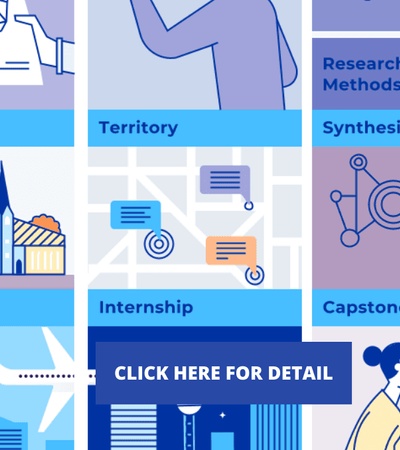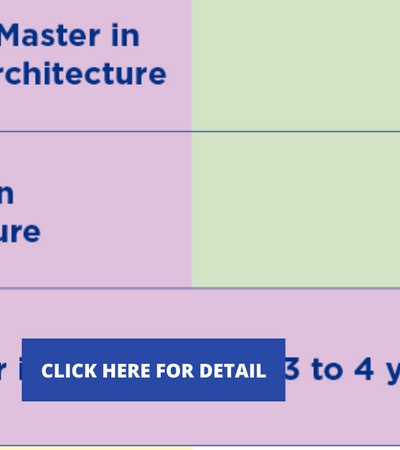- Home
- Studies
- Undergraduate Degrees
- Bachelor In Architectural Studies
A UNIQUE BACHELOR IN ARCHITECTURAL STUDIES
A UNIQUE BACHELOR IN ARCHITECTURAL STUDIES
The study plan for the Bachelor in Architectural Studies at IE University has been designed with the prestigious academic experience at its core, our academic faculty’s expert knowledge and research in each area, and the linkages between the University and the professional world.
The Bachelor in Architectural Studies aims to teach young ambitious individuals to build the proper skill set to become professionals capable of facing real-world challenges.
Through our hands-on teaching methodology, students from the Bachelor in Architectural Studies will find the perfect ideal balance between what is studied throughout their degree and the projects that are applied based on real-world scenarios.
This will aid them to develop profiles that are able to adapt to new trends happening now in the 21st century.

WANT TO KNOW MORE?
Bachelor in Architectural Studies Study Plan
Bachelor in Architectural Studies Study Plan
BACHELOR IN ARCHITECTURAL STUDIES STUDY PLAN
BACHELOR IN ARCHITECTURAL STUDIES STUDY PLAN
Students who want to broaden their academic experience within the Bachelor in Architectural Studies can include an add-on diploma in their program. Three options are available: Product Design, Graphic Design, and Interior Design.
INTERIOR DESIGN
INTERIOR DESIGN
Explore the principles of spatial design, materials, lighting, and user experience to shape functional and inspiring interior environments.
GRAPHIC DESIGN
GRAPHIC DESIGN
Master visual storytelling across branding, UX/UI, illustration, and motion graphics, combining creative expression with strategic communication.
Product Design
Product Design
Learn to design physical and digital products that blend aesthetics, usability, and innovation—turning ideas into tangible, user-centered solutions.
DEGREE INFORMATION AND INTERNAL QUALITY ASSURANCE SYSTEM
DEGREE INFORMATION AND INTERNAL QUALITY ASSURANCE SYSTEM
APPLICABLE REGULATIONS OF THE PROGRAM
APPLICABLE REGULATIONS OF THE PROGRAM
ARCHITECTURAL STUDIES IN A NUTSHELL
ARCHITECTURAL STUDIES IN A NUTSHELL
FIRST YEAR
Your journey into the world of architecture begins as soon as you arrive on campus. A coordinated sequence of Design Studio and Graphic Communication courses will teach you a vocabulary of architectural operations, and the tools to represent them properly in architectural graphic language. You will also study the latest digital tools, and will ground your studies in a broader context with an introductory course in architecture history. In your applied math and physics coursework, you’ll prepare yourself for the structural and environmental calculations you will undertake later, and will come to understand the principles that underpin the technical component of architecture. In addition, you will have the chance to work on real-life projects by applying for one of our IEU Labs, like the d-Lab, which will allow you to participate in the design and construction of real projects near our campus in Segovia.
SECOND YEAR
In your second year of study you will broaden your focus to include building technologies, with an introduction to the world of building construction, structures, and environmental technologies. You will also begin to address the city and the region in your introduction to Urban Studies coursework. All these concerns are synthesized in Design Studio, where you will explore how architectural elements and operations can create different experiences, and how architecture can accommodate-or even generate—new uses. You will also start the Experimentation and Design Entrepreneurship workshops, and develop your creativity by stepping outside the boundaries of architecture to work in photography, film, and site-specific art. In this year you will explore entrepreneurship and discover that it goes beyond starting your own studio.
THIRD YEAR
Design Studio in third year deals with an exploration of building systems and materials, and also with the challenge of working within existing built contexts. You’ll strengthen this work by broadening your knowledge of structures and environmental technologies. In your Architecture History and Theory coursework, meanwhile, you will experience a global approach to architecture, with a survey of architecture across centuries and cultures. For the next two years, you will continue your practical experience by having the chance participate in our international internship program, and to work directly with leading architects and designers in the field.
FOURTH YEAR
In the fouth year, your studies will increasingly come to focus on the city as a central element of study. Design Studio will deal with collective housing in the urban context, and with the role of architecture on the scale of the broader territory. This work will be linked with real-world global challenges, as part of the IE Impact. Urban Management and Urban Strategies will complement this focus. During your fourth year you will also have a chance to learn the latest digital technologies and continue to deepen your understanding of building structures and foundations. In Architecture History, meanwhile, you will analyze, appreciate, and evaluate the development of modern architecture from the Enlightenment to the present day.
FIFTH YEAR: APPLICATIONS
In your final year in the bachelor degree, you will begin by exploring the broad range of areas in which architects can apply their skills, through our unique one-class-at-a-time Alternative Practices sequence, in which students participate in a series of short design workshops, each focusing on a different area of expertise, such as Landscape and Environment, The City, Management and Entrepreneurship, and Design, or Digital Studies. In second semester, you will undertake a complex and comprehensive architectural project, with special emphasis on real-world challenges and building constraints. The second semester also features the Capstone Project, an individually-driven research project that serves as a culmination of your academic and intellectual experience. You will follow your own area of interest in architecture, and will work with a faculty advisor to develop research on that topic.
THE JOURNEY TO BECOME AN ARCHITECT
THE JOURNEY TO BECOME AN ARCHITECT
The unique learning journey of the Bachelor in Architectural Studies has been structured in 12 integrated learning blocks that will allow you to explore the management world in a progressive way.
From day one, you will be immersed in a learning journey designed to help you build your own path to success.
IE's Bachelor in Architectural Studies - Final Presentations
The Integration Workshop and the interdisciplinary nature of architecture
Design Studio at IE University
NAAB INTERNATIONAL CERTIFICATION
NAAB INTERNATIONAL CERTIFICATION
IE School of Architecture and Design has been awarded the National Architectural Accrediting Board (NAAB) International Certification (ICert) — a prestigious recognition held by a select group of institutions worldwide.
This certification confirms that IE University’s Bachelor in Architectural Studies and Master in Architecture meet internationally accepted standards of architectural education, with learning outcomes comparable to those of U.S.-based NAAB-accredited programs.
*Please note: The ICert does not grant direct U.S. licensure, but it can facilitate your pathway toward a NAAB-accredited master’s degree or other recognized professional routes for architectural licensure in the United States.
How this benefits our students
- Global career opportunities: The ICert gives our graduates a distinct advantage when pursuing licensure or further studies abroad, including an expedited review process and reduced fees for U.S. licensure applications.
- International academic recognition: This milestone enhances the global reputation and value of IE University’s architecture programs, positioning them among the world’s most respected.
- Professional mobility: The certification ensures our programs align with internationally accepted learning outcomes, empowering graduates to compete and collaborate globally.
- Commitment to excellence: It reaffirms IE University’s dedication to academic rigor, innovation, and global engagement, preparing architects to lead change in sustainability, equity, and cultural resilience.

The following ICert documents are available for download:
- 2025 Visiting Team Report
- Program Self Evaluation Report prepared for the 2025 visit
- 2019 Conditions for NAAB International Certification
- 2019 Procedures for NAAB International Certification
- IE School of Architecture & Design – NAAB Program Self-Evaluation Report
- IE University ICert Visit Two VTR
Upon completing our Bachelor of Architectural Studies and Master of Architecture programs, and following the completion of the accreditation process, you will receive the International Certification awarded by NAAB.
Singapore Accreditation
IE School of Architecture and Design is the first Spanish academic institution to be accredited by Singapore, a country renowned for its innovative and vibrant approach to architecture. With this accreditation, our graduates will be able to work with the same footing as graduates from the two Singaporean schools of architecture and expand their global employment opportunities.
WATCH THIS SUSTAINABLE ARCHITECTURE & DESIGN MASTERCLASS
WATCH THIS SUSTAINABLE ARCHITECTURE & DESIGN MASTERCLASS
Join David Goodman's masterclass on green building, learning stylish, eco-friendly design from top architects. Create loved, sustainable spaces. Design with the planet in mind!

Learning a new language can open up a world of new opportunities
Learning a new language can open up a world of new opportunities
IE University considers multiple language acquisition to be a key element of its educational model, leading to success in both work and study.
The Language Center at IEU is proud to offer students the possibility to study a wide range of languages, including French, German, Portuguese, Chinese, Arabic, Spanish, and English. With such a large variety of options, our students are able to personalize their academic path to meet their future career plans and objectives.

The Language Center at IEU
The Language Center at IEU
The Language Center helps students develop their multilingual communicative skills to help them flourish in the international labor market.
TIME TO PROFFESSIONAL LICENSURE
TIME TO PROFFESSIONAL LICENSURE
COMPETENCES
COMPETENCES
Basic competences
GENERAL COMPETENCES
- Possess knowledge of the history and theories of architecture as well as the history and theories of art, technology and social science related to architecture.
- Possess knowledge of the role of the fine arts as an influential factor in the quality of architectural design.
- Possess knowledge of urban planning and techniques applied to the planning process.
- Understand the structural design, construction and engineering problems of construction projects as well as the techniques used to solve them.
- Gain knowledge of the physical problems that arise with regard to buildings, as well as the different technologies they use and the purposes they serve, in order to ensure that buildings are comfortable and protected against the elements.
- Possess knowledge of industries, organizations, regulations and procedures in order to successfully complete construction projects and to incorporate building plans into planning processes.
- Understand the relationships between people and buildings and between buildings and their surrounding environment, as well as the need to connect buildings with the spaces surrounding them as a function of needs and on the human scale.
- Possess knowledge of the role of entrepreneurship and management in completing architectural and design projects.
- Understand the different job opportunities available for architects and the application of architectural tools to different related disciplines.
PROGRAM-SPECIFIC COMPETENCES
- Ability to apply graphic knowledge to the representation of spaces and objects.
- Ability to create and represent objects’ visual features and to master proportions and design techniques, including computer techniques.
- Sufficient knowledge of spatial representation systems applied to architecture and urban planning.
- Sufficient knowledge of shape analysis, shape theory and the laws of visual perception applied to architecture and urban planning.
- Sufficient knowledge of metric and projective geometry applied to architecture and urban planning.
- Sufficient knowledge of the graphic surveying techniques used during all stages of the process, from hand-drawn notes to scientific reconstruction, applied to architecture and urban planning.
- Sufficient knowledge of the principles of classical mechanics, statics, mass point geometry, and vector and tensor fields applied to architecture and urban planning.
- Sufficient knowledge of the principles of thermodynamics, acoustics and optics applied to architecture and urban planning.
- Sufficient knowledge of the principles of fluid mechanics, hydraulics, electricity and electromagnetism applied to architecture and urban planning.
- Sufficient knowledge of the fundamentals of topography, hypsometry, cartography and land modification techniques applied to architecture and urban planning.
- Applied knowledge of calculus, analytic and differential geometry and algebra.
- Ability to devise, calculate, design and build foundations, incorporating them into buildings and urban complexes.
- Ability to apply technical standards and building codes.
- Ability to conserve building structures, foundations and civil engineering work.
- Ability to conserve completed construction work.
- Ability to evaluate construction work.
- Ability to devise, calculate, design and build structural elements, incorporating them into buildings and urban complexes.
- Ability to devise, calculate, design and build internal partitioning systems, carpentry work, staircases and other finishing work, incorporating them into buildings and urban complexes.
- Ability to devise, calculate, design and build building envelope, roofing and other building shell work, incorporating them into buildings and urban complexes.
- Ability to devise, calculate, design and build utilities, sewage treatment and heating and air conditioning plumbing installations, incorporating them into buildings and urban complexes.
- Ability to conserve building shell work.
- Ability to design transformative building- and urban-level electrical utilities and audiovisual communication, acoustic conditioning and artificial lighting installations.
- Ability to conserve installations.
- Sufficient knowledge of solid, continuous media and soil mechanics, along with the plasticity, elasticity and resistance of heavy construction materials.
- Sufficient knowledge of conventional construction systems and their weaknesses.
- Sufficient knowledge of the physical and chemical properties of construction materials in terms of their manufacture, diagnosing problems with them and their use.
- Sufficient knowledge of industrialized construction systems.
- Knowledge of professional ethics, professional associations, the structure of the profession and civil liability.
- Knowledge of administrative, management and professional certification processes.
- Knowledge of how architectural firms are organized.
- Knowledge of measurement, evaluation and expert appraisal methods.
- Knowledge of on-site health and safety planning.
- Knowledge of real estate management.
- Ability to overcome architectural barriers.
- Ability to address challengers related to implementing passive environmental conditioning, including thermal and sound insulation, climate control, energy performance and natural lighting.
- Ability to catalog constructed and urban assets and to plan their protection.
- Ability to design, implement and develop basic and final designs, drafts and preliminary plans.
- Ability to design, implement and execute urban development projects.
- Ability to design, implement and carry out construction project management.
- Ability to create functional programs for buildings and urban spaces.
- Ability to carry out interventions on heritage buildings, conserving, restoring and rehabilitating them.
- Ability to exercise critical architectural judgment.
- Ability to conduct safety, evacuation and building protection projects.
- Ability to draft civil engineering projects.
- Ability to design and conduct urban construction projects as well as urbanization, gardening and landscaping projects.
- Ability to apply standards and municipal bylaws.
- Ability to conduct environmental, landscaping and environmental impact mitigation studies.
- Sufficient knowledge of general shape and composition theories as well as architectural styles.
- Sufficient knowledge of general architectural history.
- Sufficient knowledge of the methods used to study symbolization processes, practical functions and ergonomics.
- Sufficient knowledge of the methods used to study social needs, quality of life, habitability and basic housing programs.
- Sufficient knowledge of environmental protection, sustainability and energy-efficient and green design principles.
- Sufficient knowledge of Western architectural, urban planning and landscaping traditions as well as their technical, climactic, economic, social and ideological foundations.
- Sufficient knowledge of aesthetics as well as the history and theory of fine arts and the applied arts.
- Sufficient knowledge of the relationship between cultural patterns and architects’ social responsibilities.
- Sufficient knowledge of the fundamentals of vernacular architecture.
- Sufficient knowledge of urban sociology, theory, economics and history.
- Sufficient knowledge of the methodological bases of urban, regional and metropolitan planning.
- Knowledge of civil, administrative and urban planning regulations; building codes and sector-specific regulations relevant for working as a professional architect.
- Knowledge of viability analysis and supervising and coordinating integrated projects.
- Knowledge of real estate appraisal.
- Knowledge of the tools used to create and manage urban plans at all levels.
TRANSVERSAL COMPETENCES
- Identify the main cultural identity traits that characterize today’s world by understanding the most significant cultural moments throughout history.
- Behave professionally in accordance with the core principles and ethics of the profession.
- Manage unforeseen situations by being able to adapt to organizational changes.
- Use knowledge of the discipline to analyze and evaluate current situations.
- Form a part of interdisciplinary and multicultural teams to achieve shared goals in a diverse environment.
- Work actively in an international context.
FREQUENTLY ASKED QUESTIONS
FREQUENTLY ASKED QUESTIONS
What do you study in bachelor of architecture?
In a Bachelor of Architecture (B.Arch) program, you study various subjects related to architecture, including:
- Architectural design and studio courses
- Architectural history and theory
- Building materials and construction techniques
- Structural systems and building technology
- Building codes and regulations
- Sustainability and environmental design
- Urban planning and design
- Computer-aided design (CAD) and architectural visualization
- Professional practice and ethics in architecture
These courses provide a comprehensive education in the principles, techniques, and knowledge necessary for a career in architecture.
Is it hard to study architecture?
Yes, studying architecture can be challenging. It requires a combination of creativity, technical skills, critical thinking, and dedication. The workload is often demanding, with long hours of design studio work, extensive research, and rigorous coursework. Architecture students must learn to manage their time effectively, handle complex design problems, and master various architectural software and tools. However, with passion, perseverance, and a strong work ethic, it is possible to succeed in studying architecture.
Is architecture more on math?
While architecture does involve some mathematical concepts, it is not primarily focused on math. Architecture encompasses a broad range of disciplines, including design, art, engineering, history, and social sciences. Math is used in architecture for tasks such as calculating structural loads, understanding proportions, and analyzing building systems. However, the emphasis in architecture is more on creativity, design thinking, spatial awareness, and problem-solving, rather than solely on mathematics.
What do you learn in Bachelor of architecture?
In a Bachelor of Architecture (B.Arch) program, you learn a variety of subjects including architectural design, construction technology, building systems, structural analysis, architectural history, urban planning, sustainable design, and professional practice. The curriculum combines theoretical knowledge with practical skills, preparing you to design and create buildings that are functional, aesthetically pleasing, and responsive to social, cultural, and environmental contexts.
How long is bachelor in architecture?
A Bachelor of Architecture (B.Arch) program typically takes five years to complete.









